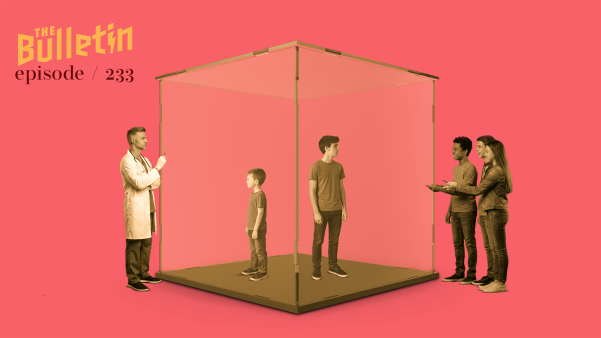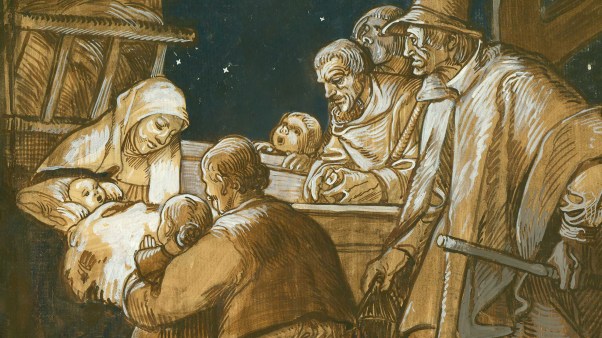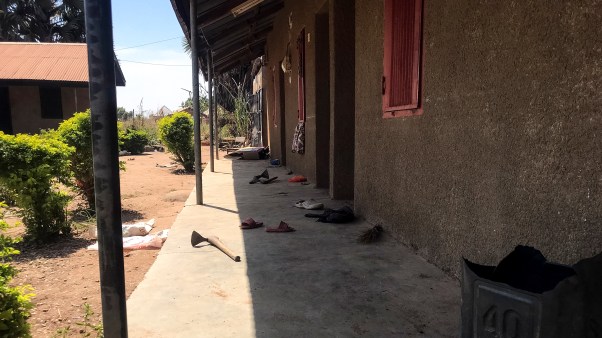When my nine-year-old son Benji was an infant, we were in and out of hospitals for the first few months of his life. He suffered from focal motor seizures and received innumerable pokes and prods to figure out the right medication and dosage to get them under control.
Then, one grey and rainy November afternoon—amid countless sleepless nights, doctor appointments, and learning how to be parents for the first time—we received a call to set up an appointment with a geneticist about our son’s newly discovered diagnosis: 1p36 deletion syndrome. We were told not to Google anything, but of course we Googled everything.
Before the appointment, my wife and I prepared several big questions, including: Is this hereditary? Is this degenerative? What else do we need to know about this syndrome?
On the day of the appointment, we arrived early and waited expectantly to satisfy our curious and concerned minds. The specialist was behind and arrived late, even by doctors’ standards. He came into the small office, still talking on the phone. A few moments passed while he finished his conversation. Then he hung up, saying Goodbye and then Hello to us in what felt like the same breath. He tossed his phone and a folder on the table before slumping into the chair.
After we asked our questions, he flipped open the folder to glance at the papers before closing it quickly. A faint buzzing noise prompted him to reengage his phone and reply with a text. Then his phone hit the table for the second time in less than a minute. He straightened up and leaned forward slightly. After glancing at us, at our infant son, and then back to us, he said:
This is your life now. You just need to love him as he is. The information in this folder has all the answers I could give you.
He slid the folder to our end of the table and then stood up from his chair. And after one last glance at us and Benji—almost as soon as he had entered—he left the room with our questions unanswered. Inside the folder was the same journal article we had found through our forbidden online search weeks earlier. It seems we were told not to Google the diagnosis beforehand because it would steal the expert’s thunder. But the truth of the maxim this meeting could have been an email was epitomized in this brief and cold exchange.
My wife and I still remember how unhelpful, even harmful, that first meeting was. And yet even a broken clock is correct twice a day—and sometimes words of helpful and enduring wisdom can come from someone as uninterested as that expert: You just need to love him as he is.
A few months later, on a warm evening in San Diego, I sat with my sleeping son in a hotel room at a conference for families with “1p-ers” (as we affectionately call the tongue-twisting diagnosis). My wife was out for the night with the other moms while I was sitting under a dim reading lamp, working my way through Andrew and Rachel Wilson’s book The Life We Never Expected.
One insight about addressing God in our prayers as “our Father” was particularly moving for me as a son of the Father who was learning to be a father to my son. The book said, “Everything I say in the rest of my prayer is founded on the truth that God is good, wants to do me good, and will do me good—so if God doesn’t immediately give me what I’m asking for, then it’s because somehow there is something better.” And I wept, not because Benji is who he is—he’s truly a delight—but because I was grieving a life as his father that I’d never expected.
As time passed, however, I found myself grieving my unexpected life less and delighting in my son more. Sure, the occasional observations of other children his age leaping and bounding past him in developmental milestones would trigger momentary pangs of disappointment and concern. But for the most part, I was just trying to get to know and understand my son.
The greatest teachers are those who poke and prod us to ask better questions than the ones we’d assumed were “essential.” And the longer I have spent time with this sweet, blonde-haired, blue-eyed boy, the more he has taught me about myself, life, and God.
One of the first questions my son prompted me to ask was about the imago Dei and what it means that humans are made in the image of God. Did my son have less of God’s image than the rest of us because of his genetic deletion, chromosomal abnormalities, developmental delays, and other exceptionalities? This isn’t the kind of question you say out loud in polite company—but it was one I wondered about, and I suspect others have too.
In this regard, I’ve been helped by biblical scholar Carmen Imes’s insights in her brilliant book, Being God’s Image. According to the Bible, she argues, human beings aren’t just made in the image of God—they are the image of God.
In her book, Imes points out that the Hebrew word translated as “image” is also used to describe idols: The “imago Dei is concrete. Like a statue that represents a king or a deity, so humans represent Yahweh to creation. Being God’s image is our human identity,” writes Imes, which means “God’s image is not something we bear; it’s something we are” (emphasis mine).
From our earliest stages of development to our final breath, we human beings are ourselves a physical representation of God’s presence on earth by virtue of our concrete existence alone. “Although our status as God’s image may lead to certain actions, ‘image’ is not something we do, but who we are,” Imes says, and it’s not “a capacity that can be lost”—intellectual or otherwise. There’s nothing we need to do or become to be qualified to represent God.
And so, I confidently say my son is imago Dei, just as I would for anyone else. Yet another question my son has prompted me to ask is, How intentional and purposeful is my son’s genetic deletion in God’s sovereign will?
When we think about the human experience, Bible folk are quick to quote Psalm 139, which tells us that we are knit together in our mother’s womb and that we are wonderfully made. But I’ve asked myself, How comfortable am I inserting my son’s name where the psalmist says “me,” “my,” and “I”? How purposefully and wonderfully was my son knit together in my wife’s womb? Would I say these things about my son without exceptions or qualifications?
One of my biggest hang-ups about seeing Benji as fearfully and wonderfully knit together was the fact that he was missing genetic material. I wrestled with whether the significant implications and issues stemming from such a microdeletion was the result of God’s intentional design.
But in a Torah Tuesday episode from Carmen Imes on Exodus 4:10–12, I was reminded that God does not shrink away from the disabilities experienced by his people. In fact, as surprising as it sounds, God takes the credit for disabilities such as deafness, muteness, and blindness. In this text, Moses raises an objection to his commissioning by describing his ineloquence and, furthermore, by rooting his ineloquence in being “slow of speech and tongue” (v. 10).
In their article “Mosaic Disability and Identity in Exodus 4:10; 6:12, 30,” Jeremy Schipper and Nyasha Junior demonstrate that the Hebraic phrase for “slow of speech and tongue” is a term for a physical disability found in ancient medical texts. And in response to Moses’ complaint about his speech impediment, they say, “God responds to Moses by assuring him that God controls all physical conditions.”
God’s response to Moses’ objection clarifies God’s intentionality in the diverse mosaic of human (dis)ability. The intentionality of disability can be disconcerting for many, to the extent that looking to persons with disabilities after reading Psalm 139 or Exodus 4:10–12 tempts us to wonder—as Adam and Eve did in the Garden—did God really say … ?
However, if all persons are imago Dei (Gen. 1:26–27), and if each person is wonderfully woven together and designed purposefully by God (Ps. 139:13–15), and if God takes credit for the lived experiences of our disabilities (Ex. 4:10–11), then we stand on stable biblical ground to assert that—while my son is a born sinner like everyone else this side of Eden—he is also who he is by God’s design.
Will we love him as he is? As frustrating as it was to hear this from an under-prepared and overly distracted specialist, these words are instructive for the church today. North American society is generally unwelcoming in its approach to the disabled community—and sadly, the church is often worse.
In her punchy and profound book, My Body Is Not a Prayer Request, Amy Kenny discusses the ableism she faces in the church as a woman with disabilities. She laments that local churches are among the most difficult spaces to inhabit for persons with disabilities. In one place she says, “I am hurt that I must justify my own existence at church. Belonging shouldn’t have the admission price of assimilation.” Kenny is right, and I’m thankful for her advocacy.
As a pastor within the local church and the father of three unique images of God, I’ve come to believe that disciples of Jesus experience two kinds of transformation in our lives in fulfilling the two greatest commandments: in loving God and loving each and every person as ourselves.
The world tells us to love our tribe and put ourselves first, but the gospel beckons us to love God and treat even the most distant stranger as our neighbor. Because of the goodness of Jesus, and so the world knows we belong to him, we are called to inhabit and exhibit a twice-transformed life that is patterned after the two most important mandates given to us by Christ—to love God with all our heart and love our neighbor as ourselves.
At next Sunday morning’s service, look around at your sanctuary and evaluate whether your church building hosts the kind of space and community where disabled persons can find a robust and rich belonging. But before that, we need to ask ourselves whether we truly believe all people, even those with disabilities, are made in God’s image and according to God’s will.
Scripture tells us that God’s way “is perfect” (Ps. 18:30) and that he is “righteous in all his ways and faithful in all he does” (Ps. 145:17). So, if we really believe each and every human being around us is fearfully and wonderfully made, will we love and serve them just as they are?
Greg Harris serves as a pastor in Vancouver. He is passionate about “deep discipleship” in the local church and spiritual formation for the often spiritually forgotten.















